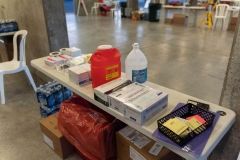
Indiana Department of Homeland Security news release:
Learn truths about radiation during Radiation Awareness Week
Indianapolis, Indiana (February 12, 2021) – The public oftentimes can misunderstand the safety and protocols concerning radiation. The Indiana Department of Homeland Security (IDHS) asks Hoosiers to learn the facts about radiation and understand more about its role in Indiana during Radiation Awareness Week (Feb. 14-20).
“The science behind radiation and the safety precautions related to it are not exactly like they are depicted in Hollywood,” said Indiana Fire Marshal Joel Thacker. “Indiana implements a comprehensive safety plan involving radiation, with public safety as the top priority.”
Thacker serves as director of the Fire and Building Safety Division at IDHS, which coordinates hazmat and radiation programs for the state.According to the International Atomic Energy Agency, most radioisotopes are artificially produced in research reactors and accelerators. Out of more than 3,000 known radioisotopes, 84 of them occur naturally in nature. Additionally, specific types of radioisotopes are produced in the medical and industrial fields.
In addition to learning more about the realities of radiation, Hoosiers are invited to take time to understand more about the processes used to safely handle and dispose of radioactive materials.
Disposing of radioactive material is an intricate, thorough process, strictly regulated in Indiana. Materials with radioisotopes sent to Indiana landfills from hospitals, industries and the environment are passed through radiation scanners as they travel toward their destination.
Radioisotopes from medical waste and construction rubble commonly are deposited into landfills, as they have a short half-life, or how quickly it decays. Materials with radioisotopes containing a longer half-life, however, are required to be sent back to wherever they were shipped from, even if they came from outside of Indiana.
“Radioactive materials, when used and disposed of responsibly, are incredibly safe and beneficial in supporting our everyday life,” Thacker said. “The IDHS radiation programs work tirelessly to ensure Indiana and its local communities are adequately educated and prepared to handle and transport radioactive materials.”
To learn more about the different types of radiation and the impacts they have on human health, visit https://www.cdc.gov/nceh/radiation/emergencies/index.htm.
&bsnp;
Indiana Department of Homeland Security
Established in 2005, the Indiana Department of Homeland Security (IDHS) leads the way to a safer and more secure Indiana. With jurisdictions involving emergency management, building code enforcement, as well as training and certification for first responders around the state, IDHS works around the clock to protect the people, property and prosperity of Indiana. For more information about IDHS, visit https://www.in.gov/dhs/.
Read more Indiana Department of Homeland Security posts.















